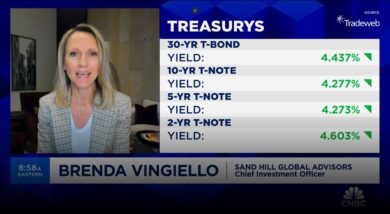Sand Hill's Chief Investment Officer, Brenda Vingiello, CFA, joins Jenny Harrington on “Halftime Report” to go over their most recent portfolio moves. Brenda's commentary begins

Opportunity Zones: What Are They and When Should I Care?
What are they?
Opportunity Zones were created by the Tax Cuts and Jobs Act of 2017 (TCJA). According to the IRS, an Opportunity Zone is “an economically-distressed community where new investments, under certain conditions, may be eligible for preferential tax treatment.” States and territories were quick to take advantage of this chance to encourage local development on the federal government’s tab, and as a result, according to the Treasury department’s cdifund.gov, there are now over 8,700 zones across all 50 states, several territories and the District of Columbia. Some of these zones are even in places that are less obviously “economically-distressed” than others. For example, the Four Seasons Hotel in East Palo Alto is located within an Opportunity Zone.
How do they work?
The Incentives: The TCJA created two incentives for investing in Opportunity Zones. First, if an investment in a zone is held for over ten years, it is fully exempt from capital gains taxes. Second, if the investment is funded with rolled-over gains from a previous investment, the taxes on those gains can be deferred for up to seven years and could be reduced by up to 15%.
Some Restrictions: All investments must be made through a Qualified Opportunity Fund (though individuals can create their own QOFs). In order to defer taxes on a previous asset sale (including common stock), the gains must be invested in a Qualified Opportunity Fund within 180 days of the sale. These gains can be deferred for up to seven years or until 12/31/26, whichever comes first; so, to maximize the tax benefits, the investment should be made by the end of 2019.
To qualify, the real estate investment in an Opportunity Zone must be either new construction or major improvement where the costs of the improvement are greater than the cost of the existing property (not including land). Construction and improvements must be finished within 30 months.
What’s the bottom line?
For an investment in an Opportunity Zone to make sense, the investment must be profitable. The essential benefit is the tax break of avoiding capital gains on any new investments. If there are no gains, then there is no point. Similarly, deferring taxes is nice, but if you tie up money in an investment that achieves no return, you would have been better off simply paying the taxes and investing the balance in Treasuries. Importantly, there is also no step up in cost basis at death on QOFs.
So, when should I care?
The TCJA creates a compelling tax benefit that reduces the hurdle rate necessary to make a comparable investment in an Opportunity Zone. For example, if prior to the TCJA an investor required a 10% internal rate of return to justify an investment in a new hotel in Puerto Rico (note: the whole island is an Opportunity Zone), it might be that a 7% IRR is now the equivalent objective on an after-tax basis.
Conclusion: There has been a lot of recent attention given to Opportunity Zones, with much of the focus placed on deferring and reducing capital gains on existing investments. To us, this is too much of the proverbial tax tail wagging the investment dog and it would be better to explore promising new investments and only then see if the tax benefits might further enhance total returns. Moreover, we are concerned about late-cycle investing in “economically-distressed” communities. Nonetheless, the tax benefits are real and thus we continue to examine possible managed opportunities in this space; and we also stand ready to provide counsel to any clients who might want to make a direct investment of this kind.
Articles and Commentary
Information provided in written articles are for informational purposes only and should not be considered investment advice. There is a risk of loss from investments in securities, including the risk of loss of principal. The information contained herein reflects Sand Hill Global Advisors' (“SHGA”) views as of the date of publication. Such views are subject to change at any time without notice due to changes in market or economic conditions and may not necessarily come to pass. SHGA does not provide tax or legal advice. To the extent that any material herein concerns tax or legal matters, such information is not intended to be solely relied upon nor used for the purpose of making tax and/or legal decisions without first seeking independent advice from a tax and/or legal professional. SHGA has obtained the information provided herein from various third party sources believed to be reliable but such information is not guaranteed. Certain links in this site connect to other websites maintained by third parties over whom SHGA has no control. SHGA makes no representations as to the accuracy or any other aspect of information contained in other Web Sites. Any forward looking statements or forecasts are based on assumptions and actual results are expected to vary from any such statements or forecasts. No reliance should be placed on any such statements or forecasts when making any investment decision. SHGA is not responsible for the consequences of any decisions or actions taken as a result of information provided in this presentation and does not warrant or guarantee the accuracy or completeness of this information. No part of this material may be (i) copied, photocopied, or duplicated in any form, by any means, or (ii) redistributed without the prior written consent of SHGA.
Video Presentations
All video presentations discuss certain investment products and/or securities and are being provided for informational purposes only, and should not be considered, and is not, investment, financial planning, tax or legal advice; nor is it a recommendation to buy or sell any securities. Investing in securities involves varying degrees of risk, and there can be no assurance that any specific investment will be profitable or suitable for a particular client’s financial situation or risk tolerance. Past performance is not a guarantee of future returns. Individual performance results will vary. The opinions expressed in the video reflect Sand Hill Global Advisor’s (“SHGA”) or Brenda Vingiello’s (as applicable) views as of the date of the video. Such views are subject to change at any point without notice. Any comments, opinions, or recommendations made by any host or other guest not affiliated with SHGA in this video do not necessarily reflect the views of SHGA, and non-SHGA persons appearing in this video do not fall under the supervisory purview of SHGA. You should not treat any opinion expressed by SHGA or Ms. Vingiello as a specific inducement to make a particular investment or follow a particular strategy, but only as an expression of general opinion. Nothing presented herein is or is intended to constitute investment advice, and no investment decision should be made based solely on any information provided on this video. There is a risk of loss from an investment in securities, including the risk of loss of principal. Neither SHGA nor Ms. Vingiello guarantees any specific outcome or profit. Any forward-looking statements or forecasts contained in the video are based on assumptions and actual results may vary from any such statements or forecasts. SHGA or one of its employees may have a position in the securities discussed and may purchase or sell such securities from time to time. Some of the information in this video has been obtained from third party sources. While SHGA believes such third-party information is reliable, SHGA does not guarantee its accuracy, timeliness or completeness. SHGA encourages you to consult with a professional financial advisor prior to making any investment decision.






